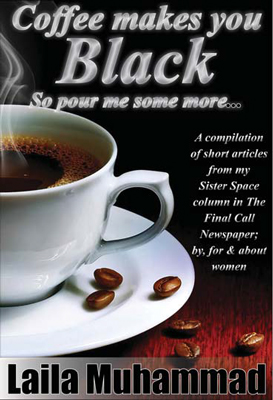‘Coffee Makes You Black’ leaves you wanting more
By Saffiyyah Muhammad | Last updated: Jun 25, 2014 - 11:00:01 PMWhat's your opinion on this article?

|
I knew if I enjoyed reading her weekly Sister Space section contributions in the newspaper, I would also like reading her columns in book form.
After several suggestions from co-workers, Sister Laila compiled articles that had appeared in Sister Space into an e-book. “Coffee Makes You Black: So pour me some more …” is published by and for Black women and deals with issues affecting sisters from skin tone to blended families.

|
When she e-mailed me a copy of her 163-page book, I eagerly downloaded it and looked at the cover, which I thought was nice. “O, wow!” I said to myself, “this is really a great book to read.”
The uniqueness of the book is found in rich anecdotes and the personal stories shared with readers. These stories drive home critical points the author makes throughout her book.
The title of the book, “Coffee Makes You Black,” comes from a story about an interaction with her grandmother when she was a little girl. The phrase “coffee makes you Black,” is also derived from an old wives’ tale in Black households where children were told drinking coffee would result in a dreadful, irreversible, darker skin tone, thus making them Black and unattractive.
Sister Laila writes, “My granny’s coffee started off black, but then she would add white sugar and non-dairy creamer. My dad on the other hand liked his coffee strictly black with a little sugar. So as I sipped the hot coffee, she yelled at me, ‘Children aren’t supposed to drink coffee.’ ‘Why not?’ I asked. ‘Because coffee makes you black,’ she said.”
As Black women, we are bombarded with negative household language and listening to this type of rhetoric damages us psychologically. Our children will have to wrestle with skin tone and hair texture issues based on these messages at home and negative messages and images outside the home.
Sister Laila writes about these unhealthy myths and offers tools for education and healing. She writes about the Eight Steps of Atonement, introduced by the Honorable Minister Louis Farrakhan in 1995 at the Million Man March, as a process that binds emotional wounds and promotes forgiveness, righting wrongs and reconciliation.

Laila Muhammad
|
She also deals with other skin tone-related and self-love issues, writing about beauty and #teamlightskin vs. #teamdarkskin.
When addressing issues of divorce, male-female relationships, sexual abuse of young girls, Black behavior (twerking), Black female images on television and feminism, her writing exudes a maturity similar to that of an older sister or friend. She is concerned about the status of Black women.
To purchase an e-book copy “Coffee Makes You Black: So pour me some more …” visit [email protected]. Follow her at liberatedvoices.blogstpot.com, and on Twitter @lailamuhammad1.
(Safiyyah Muhammad serves as copy editor for The Final Call. She is the author of children’s books Princess Feldings & The Academy of Queens” and “Prince Hasmir’s High Seas Adventure.” Her third book, “When Jaguars Roar” will be in print by August, 2014.)
INSIDE STORIES AND REVIEWS
-
-
About Harriett ... and the Negro Hollywood Road Show
By Rabiah Muhammad, Guest Columnist » Full Story -
Skepticism greets Jay-Z, NFL talk of inspiring change
By Bryan 18X Crawford and Richard B. Muhammad The Final Call Newspaper @TheFinalCall » Full Story -
The painful problem of Black girls and suicide
By Charlene Muhammad -National Correspondent- » Full Story -
Exploitation of Innocence - Report: Perceptions, policies hurting Black girls
By Charlene Muhammad -National Correspondent- » Full Story -
Big Ballin: Big ideas fuel a father’s Big Baller Brand and brash business sense
By Bryan Crawford -Contributing Writer- » Full Story






 Click Here Stay Connected!
Click Here Stay Connected!








